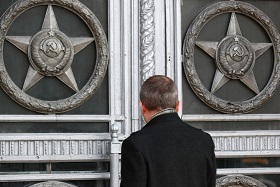Clearly, time has come that double standards in global economy were abandoned. The U.S. needs to stop following the imperative of “the dollar is our currency, but your problem” proclaimed back in 1971 by the Nixon Administration after it ended dollar’s convertibility to gold.
Freezing Russia’s monetary reserves abroad should be regarded as the West clearly pinpointing to Russia’s vassalage. The decision to switch payments for Russian gas into rubles is the result of Russia refusing to accept the role the West had assigned to it in the global economy.
What is significant is that Russia’s demand that its commodities be paid for in rubles takes the world back to the monetary system established back in 1944 at Bretton Woods. It was then that the countries partaking in the Conference agreed to pay for commodities in their national currencies via special correspondent accounts at the IMF—this was necessary, as there effectively was no mutual currency convertibility after World War II. The requirement is still in effect, with only payments in gold replaced with payments in reserve currencies included in the SDR basket. Therefore, importers of Russian gas may well legally use a specially designed IMF mechanism to gain access to ruble liquidity to pay for Russian gas deliveries.
It would be expedient to make payments for gas in rubles at the current market exchange rate, with account for Russian gas prices linked to the spot market. That would bolster the ruble’s exchange rate, an important indicator of an economic rebound.
Let’s not forget that the ruble was the world’s most underappreciated currency for the last few years—since 2014, the non-market factor of anti-Russian sanctions had a negative impact on the ruble’s exchange rate. Besides, the ruble is underappreciated on account of little demand for the financial instruments nominated in Russia’s national currency. Switching energy payments—and, subsequently, payments for other raw materials—into rubles may impact the entire monetary pricing chain on the global market, which will increase demand for funding and financial instruments nominated in rubles. Currently, a stronger ruble will improve confidence in the national currency, bringing a positive effect on the plans for modernizing Russia’s manufacturing sector.
The instructions the Russian President gave to the Federal Government, demanding that payments for the deliveries of Russian gas to “unfriendly nations” be switched into rubles is a measure of necessity that will affect many contractual clients. The decision was prompted by the seizure of Russia’s dollar- and euro-denominated foreign assets, a total of USD 300 bn worth. By taking this step, the West has effectively defaulted on its own debt commitments to non-residents.
When Western states banned taking dollars and euros into Russia, they have essentially forced the Russian leadership to switch to payments in rubles. By continuing to make payments in the Western reserve currencies, with them having effectively lost this status once the embargo was imposed, Russia risks failing to receive payment for international deliveries of its commodities. This conclusion is a no-brainer. At the same time, Russia never refused to deliver the agreed amounts and did not abandon the pricing principles enshrined in the previously concluded contracts upon the request of contractual clients from the West.
We shall recall that the recent initiative of amending contracts on gas deliveries with Russia linking gas prices to the spot market was proposed by the Europeans, and this had not been set forth in the long-term contract. The Western countries are pointedly demonstrating their inability to realize what technology underpins making payments in rubles, which appears to clearly be an “act”. Transaction-wise, this means a standard switch of monetary flows from correspondent accounts nominated in dollars to correspondent accounts nominated in rubles. However, even under the current circumstances, Europe is still considering the options of violating its contractual obligations. For instance, Bloomberg reports that Estonia intends to suggest that other EU states make only partial payments to Russia for its energy resources so that the rest of the payments would go to rebuilding Ukraine, something effectively akin to robbery.
Freezing Russia’s monetary reserves abroad should be regarded as the West clearly pinpointing to Russia’s vassalage. The decision to switch payments for Russian gas into rubles is the result of Russia refusing to accept the role the West had assigned to it in the global economy.
Note that the Russian Soviet Federative Socialist Republic, in the wake of World War I, was presented at the international economic conference in Genoa with claims of RUB 18.5 bn in gold to inflict colonial dependence on Russia. However, the Soviet delegation acted in a skilled and concerted manner, putting forward a counterclaim for damages caused by the intervention and a siege in the amount of RUB 39 bn. This step forced Western leaders to abandon their financial claims.
What is significant is that Russia’s demand that its commodities be paid for in rubles takes the world back to the monetary system established back in 1944 at Bretton Woods. It was then that the countries partaking in the Conference agreed to pay for commodities in their national currencies via special correspondent accounts at the IMF—this was necessary, as there effectively was no mutual currency convertibility after World War II. For that purpose, a consensus decision was taken that 75% of dues that member states pay into the IMF’s capital would be paid in national currencies (with the rest to be paid in gold). The requirement is still in effect, with only payments in gold replaced with payments in reserve currencies included in the SDR basket. As of today, therefore, three quarters of the IMF’s capital are made up in national currencies of its member states, an equivalent to USD 330 bn (including the USD 9 bn paid into the Fund in Russian rubles). Therefore, importers of Russian gas may well legally use a specially designed IMF mechanism to gain access to ruble liquidity to pay for Russian gas deliveries.
It would be expedient to make payments for gas in rubles at the current market exchange rate, with account for Russian gas prices linked to the spot market. That would bolster the ruble’s exchange rate, an important indicator of an economic rebound. Let’s not forget that the ruble was the world’s most underappreciated currency for the last few years—since 2014, the non-market factor of anti-Russian sanctions had a negative impact on the ruble’s exchange rate. Besides, the ruble is underappreciated on account of little demand for the financial instruments nominated in Russia’s national currency. Switching energy payments—and, subsequently, payments for other raw materials—into rubles may impact the entire monetary pricing chain on the global market, which will increase demand for funding and financial instruments nominated in rubles. Currently, a stronger ruble will improve confidence in the national currency, making financial resources cheaper on the domestic market, which will result in equipment imports from China (as the ruble becomes stronger, costs of imported equipment will drop), bringing a positive effect on the plans for modernizing Russia’s manufacturing sector.
Therefore, switching payments for deliveries Russian gas into rubles is perfectly in line with the principles of today’s multilateral monetary system. Certainly, since the dollar had pushed out all other currencies from servicing global trade, these principles were essentially abandoned. However, that does not make them any less legally valid.
What also needs stressing is that national currency is the crucial element of state sovereignty. The decision to switch to payments in rubles taken by Russia’s leadership should be considered as an important step toward restoring Russia’s financial sovereignty. Sovereign right has always been the supreme priority. Ultimately, a truly independent state has the right to demand that its foreign contractual clients pay for the country’s own commodities in the country’s own currency, which is the case when the U.S. demands such payments from its contractual clients.
Clearly, time has come that double standards in global economy were abandoned. The U.S. needs to stop following the imperative of “the dollar is our currency, but your problem” proclaimed back in 1971 by the Nixon Administration after it ended dollar’s convertibility to gold.
Instead, it would make sense to turn to the intellectual legacy of the British economist John Maynard Keynes, who compared the global economy to a closed system where surplus (profit) of some turns to be deficit (losses) of others, and vice versa. To achieve a symmetrical global development, he proposed fining both debtors and lenders. The U.S., and consequently the IMF, ignoring this recommendation resulted in ineradicable imbalances appearing in the global development owing to a chronic malfunctioning of the global monetary system. The White House’s stubbornness in this regard annihilates any attempts at a civilized settlement of conflicts.






